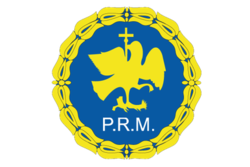
Back Велика Румъния (партия) Bulgarian Partit de la Gran Romania Catalan Strana velkého Rumunska Czech Storrumænien-partiet Danish Partidul România Mare German Partido de la Gran Rumanía Spanish Suur-Romania-puolue Finnish Parti de la Grande Roumanie French רומניה מארה (מפלגה) HE Nagy-Románia Párt Hungarian
Greater Romania Party Partidul România Mare | |
|---|---|
 | |
| President | Victor Iovici[1] |
| Founder | Corneliu Vadim Tudor Eugen Barbu |
| Founded | 20 June 1991 |
| Headquarters | Bucharest |
| Membership | 37,000 (2014 est.) |
| Ideology | |
| Political position | Centre-left (minority)[5] Right-wing to far-right (majority)[6][7] |
| Religion | Romanian Orthodoxy |
| National affiliation | National Identity Bloc in Europe |
| Colours | Blue Yellow |
| Senate | 0 / 136 |
| Chamber of Deputies | 0 / 330 |
| European Parliament | 0 / 33 |
| Mayors | 0 / 3,176 [8] |
| County Councilors | 0 / 1,340 [8] |
| Local Council Councilors | 31 / 39,900 [8] |
| Website | |
| partidulromaniamare | |
The Greater Romania Party (Romanian: Partidul România Mare, PRM) is a Romanian far-right political party.[9] Founded in May 1991 by Eugen Barbu and Corneliu Vadim Tudor, it was led by the latter from that point until his death in September 2015.[10][11] The party is sometimes referred to in English as the Great Romania Party.
It briefly participated in government from 1993 to 1995 (in Nicolae Văcăroiu's cabinet). In 2000, Tudor received the second largest number of votes in Romania's presidential elections, partially as a result of protest votes lodged by Romanians frustrated with the fractionalisation and mixed performance of the 1996–2000 Romanian Democratic Convention (CDR) government. Tudor's second-place position ensured he would compete in the second round run-off against former president and Party of Social Democracy in Romania (PDSR) candidate Ion Iliescu, who won by a large margin. Parallels are often drawn with the situation in France two years later, when far-right National Rally (RN) party leader Jean-Marie Le Pen similarly drew the second largest number of votes and was elevated, but nevertheless defeated, in the presidential run-off against Jacques Chirac.
Although Tudor clearly remained the central figure in the PRM, in March 2005 he briefly stepped down from the party presidency in favour of Corneliu Ciontu. A primary objective of the move was to provide the appearance of a shift toward the political center and to attempt to align PRM with the European People's Party (EPP) bloc in the European Parliament. During this period the PRM also briefly changed its name to the Greater Romania's People Party. EPP, however, rejected the PRM as a potential member. Tudor stated he refused to join the EPP because of its lack of identity. In June 2005, Tudor asserted that he had decided the new leadership had distanced itself from the founding principles of the party, and he sacked the new leadership and reverted the party's name back to simply the "Greater Romania Party". In November 2005, Ciontu, along with a small faction of the PRM, formed their own party, the People's Party (PP), which has since merged with the New Generation Party (PNG).
In January 2007, with Romania's accession to the EU România Mare's five MEPs joined a group of far-right parties in the European Parliament that included the French National Rally (RN) and Austrian Freedom Party (FPÖ), giving them sufficient numbers to form an official bloc, called Identity, Tradition, Sovereignty.[12] Though due to disagreements, they left the group a few months later, causing its collapse.
- ^ "Partidul "România Mare" are o nouă conducere. Ce funcție ocupă fiica lui Vadim" [PRM has elected a new president.]. b1.ro (in Romanian). 13 November 2017.
- ^ "PRM vrea să obţină 13% la viitoarele alegeri, la nivel naţional". 13 July 2018.
- ^ "Kiss FM - Partidele care-ți arată că naționalismele de doi lei din România nu au apărut odată cu AUR". 20 July 2021.
- ^ "Vadim Tudor, atac violent la adresa ungurilor".
- ^ "Partidul România Mare (PRM)". votez.info. Retrieved 21 November 2019.
- ^ "Strategiile PRM de maximizare a capitalului electoral (1996-2005)". Retrieved 16 December 2014.
- ^ "The Ideological Institutionalization of the Romanian Party System". Retrieved 16 December 2014.
- ^ a b c "2016bec.ro".
- ^ Janusz Bugajski (1995). Ethnic Politics in Eastern Europe: A Guide to Nationality Policies, Organizations, and Parties. M.E. Sharpe. p. 466. ISBN 978-0-7656-1911-2.
- ^ Alison Mutler (14 September 2015). "Corneliu Vadim Tudor, ultranationalist Romanian poet and politician, dies at 65". The Washington Post. Retrieved 16 September 2015.
- ^ Alina Novăceanu (14 September 2015). "Corneliu Vadim Tudor, de la PCR la PRM, candidat de cinci ori la președinție". Mediafax. Retrieved 16 September 2015.
- ^ Traynor, Ian (January 8, 2007). "Romania's first gift to the European Union - a caucus of neo-fascists and Holocaust deniers". The Guardian.
© MMXXIII Rich X Search. We shall prevail. All rights reserved. Rich X Search